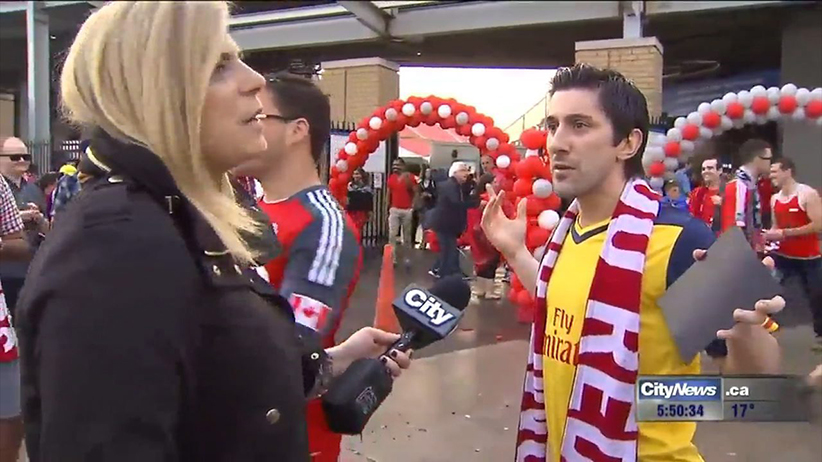Why we should take #FHRITP seriously
‘Misogyny, unfiltered’: Emma Teitel on why the decision to fire a man caught hurling an obscenity at CityNews reporter was justified
Shauna Hunt interviews a Toronto FC soccer fan in Toronto on Sunday, May 10, 2015, in this video frame grab. A Toronto reporter is setting social media abuzz by fighting back against a controversial trend that sees men hurling obscenities at female journalists on the job. Shauna Hunt of CityNews was the latest woman to be heckled by a group of men shouting sexually explicit comments into her microphone as she tried to cover a local soccer game. THE CANADIAN PRESS/HO – CityNews
Share

“Boys will be boys.” The cliché, uttered in response to all manner of male-dominated offences, from the upturned toilet seat to aggravated sexual assault, was revived again yesterday, this time in order to defend a group of grown men who believe it is the highest form of comedy to verbally harass a female reporter on the job. The men in question, a set of seemingly drunk Toronto FC soccer fans, stood outside BMO Field on Sunday and snickered as another man with a very bad goatee (he has yet to be identified) interrupted CityNews anchor Shauna Hunt’s live broadcast. More specifically, this mystery goatee man walked into the frame as Hunt interviewed a couple of presumably normal soccer fans and yelled into the camera, “F–k her right in the pussy.”
This prank, if you want to call it that, is apparently occurring all over the country (Hunt has said she is inundated with the phrase multiple times a day). It originated with American filmmaker John Cain, who made a series of videos in which the same man interrupts live broadcasts spouting the crude phrase—sometimes even stealing the microphone out of the reporter’s hands to do so. Cain’s videos, however, turned out to be a hoax, complete with phony newscasts and phony reporters. But his invented prank and its vulgar expression stuck—and spawned copycats all over the world.
Related:
Q&A: Shauna Hunt on why she stood up to FHRITP
FHRITP: When Twitter shaming works
The copycats in this particular story will pay a high price for their behaviour if they haven’t already: When footage of Hunt confronting the men went viral, one of the prank’s defenders, a six-figure-earning Hydro One employee identified as Shawn Simoes, was hastily fired.
Yet despite the general public’s support for Hunt and condemnation of the losers who would have interrupted her broadcast, I noticed a tendency by some, both online and off, to question the justice of the situation. There were, of course, the usual “boys will be boys” responses, which litter the Internet comment threads beneath all stories about men behaving badly. But I also noticed concern on the part of well-intentioned people who find Internet shaming, in any capacity, cruel and unusual. (One Reddit user has even pleaded with other users lambasting Shawn Simoes to be mindful of the fact that online shaming can lead to suicide.) It is highly unlikely, after all, that Simoes will find work or happiness anytime soon. His life has been temporarily—perhaps permanently—upended. The question is, should we care?
I think this may be a rare instance in which we shouldn’t.
Related: Q&A with Jon Ronson on his book about public shaming
The FHRITP guys are not likely evil; nor have they committed “verbal rape,” a term I’ve heard tossed around in the last few days, one I really hope does not enter the mainstream lexicon. (What’s next? Verbal murder?) But there is real danger in dismissing this trend as an idiotic, random piece of public performance. Because when you strip everything away from the prank—from its bro-ish posturing to its expletive-laced proclamation—what you get is misogyny unfiltered, plain as day. What you get is this:
“Yes, I may be a fool and you a professional. But you’re also a woman who would like to be taken seriously. And I simply won’t stand for that.”